第一哲学沉思录笛卡尔
笛卡尔《第一哲学沉思录》(二)

笛卡尔《第⼀哲学沉思录》(⼆)MEDITATION II.OF THE NATURE OF THE HUMAN MIND;AND THAT IT IS MORE EASILY KNOWNTHAN THE BODY.1. The Meditation of yesterday has filled my mind with so many doubts, that it is no longer in my power to forget them. Nor do I see, meanwhile, any principle on which they can be resolved; and, just as if I had fallen all of a sudden into very deep water, I am so greatly disconcerted as to be unable either to plant my feet firmly on the bottom or sustain myself by swimming on the surface. I will, nevertheless, make an effort, and try anew the same path on which I had entered yesterday, that is, proceed by casting aside all that admits of the slightest doubt, not less than if I had discovered it to be absolutely false; and I will continue always in this track until I shall find something that is certain, or at least, if I can do nothing more, until I shall know with certainty that there is nothing certain. Archimedes, that he might transport the entire globe from the place it occupied to another, demanded only a point that was firm and immovable; so, also, I shall be entitled to entertain the highest expectations, if I am fortunate enough to discover only one thing that is certain and indubitable.[L][F]2. I suppose, accordingly, that all the things which I see are false (fictitious); I believe that none of those objects which my fallacious memory represents ever existed; I suppose that I possess no senses; I believe that body, figure, extension, motion, and place are merely fictions of my mind. What is there, then, that can be esteemed true ? Perhaps this only, that there is absolutely nothing certain.[L][F]3. But how do I know that there is not something different altogether from the objects I have now enumerated, of which it is impossible to entertain the slightest doubt? Is there not a God, or some being, by whatever name I may designate him, who causes these thoughts to arise in my mind ? But why suppose such a being, for it may be I myself am capable of producing them? Am I, then, at least not something? But I before denied that I possessed senses or a body; I hesitate, however, for what follows from that? Am I so dependent on the body and the senses that without these I cannot exist? But I had the persuasion that there was absolutely nothing in the world, that there was no sky and no earth, neither minds nor bodies; was I not, therefore, at the same time, persuaded that I did not exist? Far from it; I assuredly existed, since I was persuaded. But there is I know not what being, who is possessed at once of the highest power and the deepest cunning, who is constantly employing all his ingenuity in deceiving me. Doubtless, then, I exist, since I am deceived; and, let him deceive me as he may, he can never bring it about that I am nothing, so long as I shall be conscious that I am something. So that it must, in fine, be maintained, all things being maturely and carefully considered, that this proposition (pronunciatum ) I am, I exist, is necessarily true each time it is expressed by me, or conceived in my mind.[L][F]4. But I do not yet know with sufficient clearness what I am, though assured that I am; and hence, in the next place, I must take care, lest perchance I inconsiderately substitute some other object in room of what is properly myself, and thus wander from truth, even in that knowledge ( cognition ) which I hold to be of all others the most certain and evident. For this reason, I will now consider anew what I formerly believed myself to be, before I entered on the present train of thought; and of my previous opinion I will retrench all that can in the least be invalidated by the grounds of doubt I have adduced, in order that there may at length remain nothing but what is certain and indubitable. [L][F]5. What then did I formerly think I was? Undoubtedly I judged that I was a man. But what is a man? Shall I say a rational animal? Assuredly not; for it would be necessary forthwith to inquire into what is meant by animal, and what by rational, and thus, from a single question, I should insensibly glide into others, and these more difficult than the first; nor do I now possess enough of leisure to warrant me in wasting my time amid subtleties of this sort. I prefer here to attend to the thoughts that sprung up of themselves in my mind, and were inspired by my own nature alone, when I applied myself to the consideration of what I was. In the first place, then, I thought that I possessed a countenance, hands, arms, and all the fabric of members that appears in a corpse, and which I called by the name of body. It further occurred to me that I was nourished, that I walked, perceived, and thought, and all those actions I referred to the soul; but what the soul itself was I either did not stay to consider, or, if I did, I imagined that it was something extremely rare and subtile, like wind, or flame, or ether, spread through my grosser parts. As regarded the body, I did not even doubt of its nature, but thought I distinctly knew it, and if I had wished to describe it according to the notions I then entertained, I should have explained myself in this manner: By body I understand all that can be terminated by a certain figure; that can be comprised in a certain place, and so fill a certain space as therefrom to exclude every other body; that can be perceived either by touch, sight, hearing, taste, or smell; that can be moved in different ways, not indeed of itself, but by something foreign to it by which it is touched [and from which it receives the impression]; for the power of self-motion, as likewise that of perceiving and thinking, I held as by no means pertaining to the nature of body; on the contrary, I was somewhat astonished to find such faculties existing in some bodies.[L][F]6. But [as to myself, what can I now say that I am], since I suppose there exists an extremely powerful, and, if I may sospeak, malignant being, whose whole endeavors are directed toward deceiving me ? Can I affirm that I possess any one of all those attributes of which I have lately spoken as belonging to the nature of body ? After attentively considering them in my own mind, I find none of them that can properly be said to belong to myself. To recount them were idle and tedious. Let us pass, then, to the attributes of the soul. The first mentioned were the powers of nutrition and walking; but, if it be true that I have no body, it is true likewise that I am capable neither of walking nor of being nourished. Perception is another attribute of the soul; but perception too is impossible without the body; besides, I have frequently, during sleep, believed that I perceived objects which I afterward observed I did not in reality perceive. Thinking is another attribute of the soul; and here I discover what properly belongs to myself. This alone is inseparable from me. I am--I exist: this is certain; but how often? As often as I think; for perhaps it would even happen, if I should wholly cease to think, that I should at the same time altogether cease to be. I now admit nothing that is not necessarily true. I am therefore, precisely speaking, only a thinking thing, that is, a mind (mens sive animus), understanding, or reason, terms whose signification was before unknown to me. I am, however, a real thing, and really existent; but what thing? The answer was, a thinking thing. [L][F]7. The question now arises, am I aught besides? I will stimulate my imagination with a view to discover whether I am not still something more than a thinking being. Now it is plain I am not the assemblage of members called the human body; I am not a thin and penetrating air diffused through all these members, or wind, or flame, or vapor, or breath, or any of all the things I can imagine; for I supposed that all these were not, and, without changing the supposition, I find that I still feel assured of my existence. But it is true, perhaps, that those very things which I suppose to be non-existent, because they are unknown to me, are not in truth different from myself whom I know. This is a point I cannot determine, and do not now enter into any dispute regarding it. I can only judge of things that are known to me: I am conscious that I exist, and I who know that I exist inquire into what I am. It is, however, perfectly certain that the knowledge of my existence, thus precisely taken, is not dependent on things, the existence of which is as yet unknown to me: and consequently it is not dependent on any of the things I can feign in imagination. Moreover, the phrase itself, I frame an image (efffngo), reminds me of my error; for I should in truth frame one if I were to imagine myself to be anything, since to imagine is nothing more than to contemplate the figure or image of a corporeal thing; but I already know that I exist, and that it is possible at the same time that all those images, and in general all that relates to the nature of body, are merely dreams [or chimeras]. From this I discover that it is not more reasonable to say, I will excite my imagination that I may know more distinctly what I am, than to express myself as follows: I am now awake, and perceive something real; but because my perception is not sufficiently clear, I will of express purpose go to sleep that my dreams may represent to me the object of my perception with more truth and clearness. And, therefore, I know that nothing of all that I can embrace in imagination belongs to the knowledge which I have of myself, and that there is need to recall with the utmost care the mind from this mode of thinking, that it may be able to know its own nature with perfect distinctness.[L][F]8. But what, then, am I? A thinking thing, it has been said. But what is a thinking thing? It is a thing that doubts, understands, [conceives], affirms, denies, wills, refuses; that imagines also, and perceives. [L][F]9. Assuredly it is not little, if all these properties belong to my nature. But why should they not belong to it? Am I not that very being who now doubts of almost everything; who, for all that, understands and conceives certain things; who affirms one alone as true, and denies the others; who desires to know more of them, and does not wish to be deceived; who imagines many things, sometimes even despite his will; and is likewise percipient of many, as if through the medium of the senses. Is there nothing of all this as true as that I am, even although I should be always dreaming, and although he who gave me being employed all his ingenuity to deceive me? Is there also any one of these attributes that can be properly distinguished from my thought, or that can be said to be separate from myself? For it is of itself so evident that it is I who doubt, I who understand, and I who desire, that it is here unnecessary to add anything by way of rendering it more clear. And I am as certainly the same being who imagines; for although it may be (as I before supposed) that nothing I imagine is true, still the power of imagination does not cease really to exist in me and to form part of my thought. In fine, I am the same being who perceives, that is, who apprehends certain objects as by the organs of sense, since, in truth, I see light, hear a noise, and feel heat. But it will be said that these presentations are false, and that I am dreaming. Let it be so. At all events it is certain that I seem to see light, hear a noise, and feel heat; this cannot be false, and this is what in me is properly called perceiving (sentire), which is nothing else than thinking.[L][F]10. From this I begin to know what I am with somewhat greater clearness and distinctness than heretofore. But, nevertheless, it still seems to me, and I cannot help believing, that corporeal things, whose images are formed by thought [which fall under the senses], and are examined by the same, are known with much greater distinctness than that I know not what part of myself which is not imaginable; although, in truth, it may seem strange to say that I know and comprehend with greater distinctness things whose existence appears to me doubtful, that are unknown, and do not belong to me, than others of whose reality I am persuaded, that are known to me, and appertain to my proper nature; in a word, than myself. But I see clearly what is the state of the case. My mind is apt to wander, and will not yet submit to be restrained within the limits o truth. Let us therefore leave the mind to itself once more, and, according to it every kind of liberty [permit it to consider the objects that appear to it from without], in order that, having afterward withdrawn it from these gently and opportunely [ and fixed it on the consideration of its being and the properties it finds in itself], it may then be the more easily controlled.[L][F]11. Let us now accordingly consider the objects that are commonly thought to be [the most easily, and likewise] the most distinctly known, viz., the bodies we touch and see; not, indeed, bodies in general, for these general notions are usuallysomewhat more confused, but one body in particular. Take, for example, this piece of wax; it is quite fresh, having been but recently taken from the beehive; it has not yet lost the sweetness of the honey it contained; it still retains somewhat of the odor of the flowers from which it was gathered; its color, figure, size, are apparent ( to the sight); it is hard, cold, easily handled; and sounds when struck upon with the finger. In fine, all that contributes to make a body as distinctly known as possible, is found in the one before us. But, while I am speaking, let it be placed near the fire--what remained of the taste exhales, the smell evaporates, the color changes, its figure is destroyed, its size increases, it becomes liquid, it grows hot, it can hardly be handled, and, although struck upon, it emits no sound. Does the same wax still remain after this change? It must be admitted that it does remain; no one doubts it, or judges otherwise. What, then, was it I knew with so much distinctness in the piece of wax? Assuredly, it could be nothing of all that I observed by means of the senses, since all the things that fell under taste, smell, sight, touch, and hearing are changed, and yet the same wax remains. [L][F]12. It was perhaps what I now think, viz., that this wax was neither the sweetness of honey, the pleasant odor of flowers, the whiteness, the figure, nor the sound, but only a body that a little before appeared to me conspicuous under these forms, and which is now perceived under others. But, to speak precisely, what is it that I imagine when I think of it in this way? Let it be attentively considered, and, retrenching all that does not belong to the wax, let us see what remains. There certainly remains nothing, except something extended, flexible, and movable. But what is meant by flexible and movable ? Is it not that I imagine that the piece of wax, being round, is capable of becoming square, or of passing from a square into a triangular figure ? Assuredly such is not the case, because I conceive that it admits of an infinity of similar changes; and I am, moreover, unable to compass this infinity by imagination, and consequently this conception which I have of the wax is not the product of the faculty of imagination. But what now is this extension ? Is it not also unknown ? for it becomes greater when the wax is melted, greater when it is boiled, and greater still when the heat increases; and I should not conceive [clearly and] according to truth, the wax as it is, if I did not suppose that the piece we are considering admitted even of a wider variety of extension than I ever imagined, I must, therefore, admit that I cannot even comprehend by imagination what the piece of wax is, and that it is the mind alone ( mens, Lat., entendement,, F.) which perceives it. I speak of one piece in particular; for as to wax in general, this is still more evident. But what is the piece of wax that can be perceived only by the [understanding or] mind? It is certainly the same which I see, touch, imagine; and, in fine, it is the same which, from the beginning, I believed it to be. But (and this it is of moment to observe) the perception of it is neither an act of sight, of touch, nor of imagination, and never was either of these, though it might formerly seem so, but is simply an intuition (inspectio) of the mind, which may be imperfect and confused, as it formerly was, or very clear and distinct, as it is at present, according as the attention is more or less directed to the elements which it contains, and of which it is composed.[L][F]13. But, meanwhile, I feel greatly astonished when I observe [the weakness of my mind, and] its proneness to error. For although, without at all giving expression to what I think, I consider all this in my own mind, words yet occasionally impede my progress, and I am almost led into error by the terms of ordinary language. We say, for example, that we see the same wax when it is before us, and not that we judge it to be the same from its retaining the same color and figure: whence I should forthwith be disposed to conclude that the wax is known by the act of sight, and not by the intuition of the mind alone, were it not for the analogous instance of human beings passing on in the street below, as observed from a window. In this case I do not fail to say that I see the men themselves, just as I say that I see the wax; and yet what do I see from the window beyond hats and cloaks that might cover artificial machines, whose motions might be determined by springs ? But I judge that there are human beings from these appearances, and thus I comprehend, by the faculty of judgment alone which is in the mind, what I believed I saw with my eyes.[L][F]14. The man who makes it his aim to rise to knowledge superior to the common, ought to be ashamed to seek occasions of doubting from the vulgar forms of speech: instead, therefore, of doing this, I shall proceed with the matter in hand, and inquire whether I had a clearer and more perfect perception of the piece of wax when I first saw it, and when I thought I knew it by means of the external sense itself, or, at all events, by the common sense (sensus communis), as it is called, that is, by the imaginative faculty; or whether I rather apprehend it more clearly at present, after having examined with greater care, both what it is, and in what way it can be known. It would certainly be ridiculous to entertain any doubt on this point. For what, in that first perception, g was there distinct ? What did I perceive which any animal might not have perceived ? But when I distinguish the Oval from its exterior forms, and when, as if I had stripped it of its vestments, I consider it quite naked, it is certain, although some error may still be found in my judgment, that I cannot, nevertheless, thus apprehend it without possessing a human mind.[L][F]15. But finally, what shall I say of the mind itself, that is, of myself ? for as yet I do not admit that I am anything but mind. What, then! I who seem to possess so distinct an apprehension of the piece of wax, do I not know myself, both with greater truth and certitude, and also much more distinctly and clearly? For if I judge that the wax exists because I see it, it assuredly follows, much more evidently, that I myself am or exist, for the same reason: for it is possible that what I see may not in truth be wax, and that I do not even possess eyes with which to see anything; but it cannot be that when I see, or, which comes to the same thing, when I think I see, I myself who think am nothing. So likewise, if I judge that the wax exists because I touch it, it will still also follow that I am; and if I determine that my imagination, or any other cause, whatever it be, persuades me of the existence of the wax, I will still draw the same conclusion. And what is here remarked of the piece of wax, is applicable to all the other things that are external to me. And further, if the [notion or] perception of wax appeared to me more precise and distinct, after that not only sight and touch, but many other causes besides, rendered it manifest to my apprehension, withhow much greater distinctness must I now know myself, since all the reasons that contribute to the knowledge of the nature of wax, or of any body whatever, manifest still better the nature of my mind ? And there are besides so many other things in the mind itself that contribute to the illustration of its nature, that those dependent on the body, to which I have here referred, scarcely merit to be taken into account.[L][F]16. But, in conclusion, I find I have insensibly reverted to the point I desired; for, since it is now manifest to me that bodies themselves are not properly perceived by the senses nor by the faculty of imagination, but by the intellect alone; and since they are not perceived because they are seen and touched, but only because they are understood [ or rightly comprehended by thought ], I readily discover that there is nothing more easily or clearly apprehended than my own mind. But because it is difficult to rid one's self so promptly of an opinion to which one has been long accustomed, it will be desirable to tarry for some time at this stage, that, by long continued meditation, I may more deeply impress upon my memory this new knowledge.[L][F][LoD] [S] [P] [M 1] [M 3] [M 4] [M 5] [M 6]。
对笛卡尔“我思故我在”多重解读
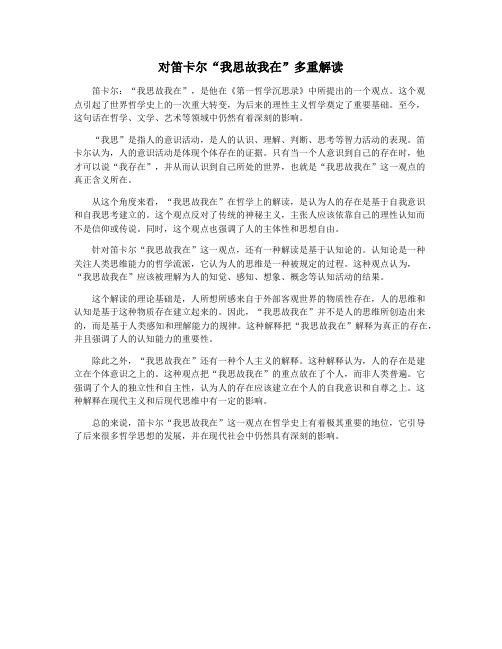
对笛卡尔“我思故我在”多重解读笛卡尔:“我思故我在”,是他在《第一哲学沉思录》中所提出的一个观点。
这个观点引起了世界哲学史上的一次重大转变,为后来的理性主义哲学奠定了重要基础。
至今,这句话在哲学、文学、艺术等领域中仍然有着深刻的影响。
“我思”是指人的意识活动,是人的认识、理解、判断、思考等智力活动的表现。
笛卡尔认为,人的意识活动是体现个体存在的证据。
只有当一个人意识到自己的存在时,他才可以说“我存在”,并从而认识到自己所处的世界,也就是“我思故我在”这一观点的真正含义所在。
从这个角度来看,“我思故我在”在哲学上的解读,是认为人的存在是基于自我意识和自我思考建立的。
这个观点反对了传统的神秘主义,主张人应该依靠自己的理性认知而不是信仰或传说。
同时,这个观点也强调了人的主体性和思想自由。
针对笛卡尔“我思故我在”这一观点,还有一种解读是基于认知论的。
认知论是一种关注人类思维能力的哲学流派,它认为人的思维是一种被规定的过程。
这种观点认为,“我思故我在”应该被理解为人的知觉、感知、想象、概念等认知活动的结果。
这个解读的理论基础是,人所想所感来自于外部客观世界的物质性存在,人的思维和认知是基于这种物质存在建立起来的。
因此,“我思故我在”并不是人的思维所创造出来的,而是基于人类感知和理解能力的规律。
这种解释把“我思故我在”解释为真正的存在,并且强调了人的认知能力的重要性。
除此之外,“我思故我在”还有一种个人主义的解释。
这种解释认为,人的存在是建立在个体意识之上的。
这种观点把“我思故我在”的重点放在了个人,而非人类普遍。
它强调了个人的独立性和自主性,认为人的存在应该建立在个人的自我意识和自尊之上。
这种解释在现代主义和后现代思维中有一定的影响。
总的来说,笛卡尔“我思故我在”这一观点在哲学史上有着极其重要的地位,它引导了后来很多哲学思想的发展,并在现代社会中仍然具有深刻的影响。
第一哲学沉思录读书笔记

第一哲学沉思录读书笔记以下是关于笛卡尔《第一哲学沉思录》的笔记,主要内容在对第五个沉思的分析。
第一个沉思:普遍怀疑沉思内容梳理:怀疑感官经验——怀疑梦、幻想和真实——形成普遍怀疑——找寻确然可信之物——猜想妖怪的欺骗第二个沉思:唯我不假沉思内容梳理:即使被骗,但我是存在的——理智比感觉可靠——人通过精神而非感官领会物体——精神比物体性的东西要清楚第三个沉思:上帝存在沉思内容梳理:领会清楚明白即真实——上帝观念被我清楚领会——上帝观念只能来自更圆满(后天论证)——上帝观念特有的规范性(先天论证) 第四个沉思:真理与错误沉思内容梳理:上帝圆满,故不会骗人——人会犯错而非不犯错是上帝使然——自由意志高于道德善恶和永不犯错第五个沉思:物体、上帝沉思内容梳理:“待检查的东西”——上帝究竟是如何规范人类的精神的?我们的本性到底是被上帝归入到不完满中,还是上帝故意如此为之?“认识真理”——必须做的是把注意力放在精神所领会得清楚明白的事情上;必须不做的是把意志放任在理智范围外,对理智所不清楚明白的事情下判断“认识”——之前的沉思所说的,精神比物体性的东西要清楚明白,感官经验的真实性值得怀疑“这些东西的观念”——关于物质性的东西的观念,比如后面所说的连续量、广延“与本性相合”——数目、形状、运动等物质性的东西的观念,似乎早就存在于我的脑海中,是某种先天存在的东西(联系康德“先天综合判断”)“某些东西”——物质性的东西“真实不变的本性”——与我的精神相对,即不依赖于我的精神而存在的形式,比如三角形的形式和性质。
换句话说,我们在现实中看到的圆形也许是假的,甚至说现实中根本没有真正的圆形,但是圆形背后的属性却不是我们自己能够凭空捏造的。
“论物质性的东西”——三角形的物体给我带来的感官经验,与三角形的形式和性质给我的认识是完全不同的,前者可能是多种多样的和不真实的,但是后者却是能够领会的清楚明白的。
而根据之前的论述可知,精神的本性告诉我们,领会的清楚明白的就是真实的。
4(1)事物的普遍联系与发展

• “在第五个沉思里,除解释一般意义 下的物体性以外,还用新的理由来论 证了上帝的存在,在这些理由中虽然 会遇到某些困难,但是这些困难我将 在对给我提出的反驳所做的答辩里去 解决。还有,在那里也看到,几何学 论证的正确性本身取决于对上帝的认 识这一点怎么是真的。”
• “最后,在第六个沉思里,我把理智活动和想像 活动分别开来;我在那里描述了这种分别的标志。 在那里我指出人的灵魂实在有别于肉体,然而又 和肉体紧密结合得就象一个东西似的。由感官产 生的一些错误以及避免错误的办法都在那里阐明 了。最后,我在那里指出了各种理由来说明物质 的东西的存在,这并不是因为我断定这些理由对 于它们所证明的东西是有好处的,例如有一个世 界,人有肉体,以及诸如此类的事情,这些都是 任何一个正常人从来没有怀疑过的;而是因为仔 细观察起来,人们看出它们不如导致我们对上帝 和我们的灵魂的认识的那些理由那样明显、有力, 因而导致我们在精神上对上帝和我们的灵魂的认 识的理由是最可靠、最明显的理由。这就是我计 划要在这六个沉思里证明的全部东西。我在这里 省略了其他很多问题,关于那些问题,我在这本 书里也在适当的机会讲到了。”
“缘起说”
目的论
2、联系的普遍性
(1)每一事物内部要素之间 是相互联系的 (2)每一事物同周围其他事物之间 是相互联系的 (3)整个世界是由彼此相异又相联的 事物所构成的有机整体
26
3、联系的多样性
不同的联系构成事 物内部和事物之间的 存在状态和发展趋势。
27
多样性
多样性:本质联系与非本 质联系
从过程看
某种运动的发生
33
一、事物的普遍联系与发展之(二)
2 发展是前进的上升的运动, 发展的实质是新事物的产生和旧 事物的灭亡。
笛卡尔的六个哲学沉思
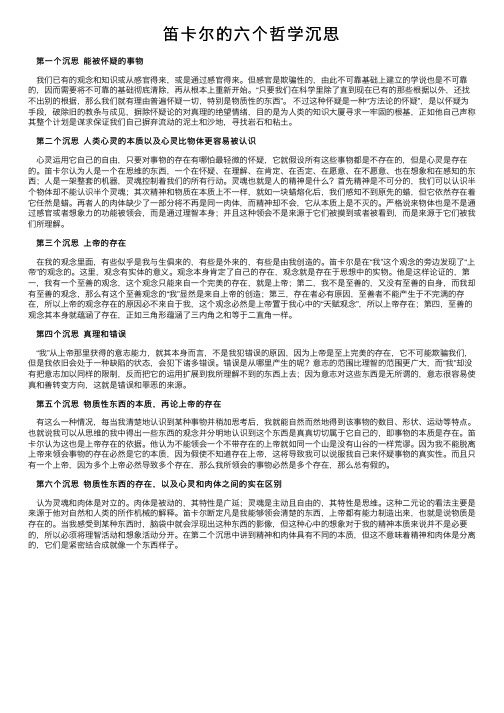
笛卡尔的六个哲学沉思第⼀个沉思能被怀疑的事物我们已有的观念和知识或从感官得来,或是通过感官得来。
但感官是欺骗性的,由此不可靠基础上建⽴的学说也是不可靠的,因⽽需要将不可靠的基础彻底清除,再从根本上重新开始。
“只要我们在科学⾥除了直到现在已有的那些根据以外,还找不出别的根据,那么我们就有理由普遍怀疑⼀切,特别是物质性的东西”。
不过这种怀疑是⼀种“⽅法论的怀疑”,是以怀疑为⼿段,破除旧的教条与成见,摒除怀疑论的对真理的绝望情绪,⽬的是为⼈类的知识⼤厦寻求⼀牢固的根基,正如他⾃⼰声称其整个计划是谋求保证我们⾃⼰摒弃流动的泥⼟和沙地,寻找岩⽯和粘⼟。
第⼆个沉思⼈类⼼灵的本质以及⼼灵⽐物体更容易被认识⼼灵运⽤它⾃⼰的⾃由,只要对事物的存在有哪怕最轻微的怀疑,它就假设所有这些事物都是不存在的,但是⼼灵是存在的。
笛卡尔认为⼈是⼀个在思维的东西,⼀个在怀疑、在理解、在肯定、在否定、在愿意、在不愿意、也在想象和在感知的东西;⼈是⼀架整套的机器,灵魂控制着我们的所有⾏动。
灵魂也就是⼈的精神是什么?⾸先精神是不可分的,我们可以认识半个物体却不能认识半个灵魂;其次精神和物质在本质上不⼀样,就如⼀块蜡熔化后,我们感知不到原先的蜡,但它依然存在着它任然是蜡。
再者⼈的⾁体缺少了⼀部分将不再是同⼀⾁体,⽽精神却不会,它从本质上是不灭的。
严格说来物体也是不是通过感官或者想象⼒的功能被领会,⽽是通过理智本⾝;并且这种领会不是来源于它们被摸到或者被看到,⽽是来源于它们被我们所理解。
第三个沉思上帝的存在在我的观念⾥⾯,有些似乎是我与⽣俱来的,有些是外来的,有些是由我创造的。
笛卡尔是在“我”这个观念的旁边发现了“上帝”的观念的。
这⾥,观念有实体的意义。
观念本⾝肯定了⾃⼰的存在,观念就是存在于思想中的实物。
他是这样论证的,第⼀,我有⼀个⾄善的观念,这个观念只能来⾃⼀个完美的存在,就是上帝;第⼆,我不是⾄善的,⼜没有⾄善的⾃⾝,⽽我却有⾄善的观念,那么有这个⾄善观念的“我”显然是来⾃上帝的创造;第三,存在者必有原因,⾄善者不能产⽣于不完满的存在,所以上帝的观念存在的原因必不来⾃于我,这个观念必然是上帝置于我⼼中的“天赋观念”,所以上帝存在;第四,⾄善的观念其本⾝就蕴涵了存在,正如三⾓形蕴涵了三内⾓之和等于⼆直⾓⼀样。
浅析笛卡尔的“普遍怀疑”

我们 。
尔 的《 第一哲学沉思 录》 是 以 自传体形式来写 的。这使读者像作者
一
少起就接受 了很多虚 妄的观念 , 并 在此基础上建立 了许多知识。 我 的怀疑 。 但是笛卡尔要怀疑的那些 东西 到底是什么呢? 是那些外在 们 应该 排 除 那 些谬 误 , 寻 找 真知 识 的根 基 , 由此建 立 新 的知 识 大 厦 。 于我们感觉 的事物还是 自己的观念本 身?他没有 区分心中的东西 与客观实在 的东西 的界限 。 心 中的东西或人的认 识可 能是错误 的 、 虚幻 的 , 但作为人的认识 的原 因或对象 的外部世界 的客观存在 , 它 是我们认识真理 的根据和保证 。 而实际上 , 笛卡尔所要怀疑的东西 只是他 自己心 中的感觉或观念。
有 四条边 , 这样 我们 一直认 为是真 的命题是错误的。 但他不能违背 求真理 的创新精神和大无畏气概 。后来 的近代思想家无不从笛卡 不过 , 笛卡 尔并不是无 信仰 , 因为宗教神学 的上帝是至善 的, 不会故 意使人 犯错 误。笛卡 尔 的怀疑主义精神中获得思想解放 的勇气 。 也不是封建制度 的叛逆者。他信奉 天主教 , 主张服从现行 尔假定 了恶魔 ( 他的能力不亚于上 帝) , 是他欺骗了我们。 同样也有 神论者 , 在他的思想中一直存在着革新与保守 、 反叛与 种 可能 : 他使三加 四等 于七 、 正方 形有 四条边 , 这样我们一 直认 国家 的制度和法令。 这是那个时代资产阶级思想家 软弱的表现。 为是真 的命题是错误 的。 但他不能违背信仰 , 因为宗教神学的上帝 顺从两种对立的倾 向 , 因此 , 他的怀疑最终是不彻底 的, 他为宗教信仰 留下 了地盘 。笛卡 是至 善 , 不会故 意使人犯错误 的。 笛卡尔假定 了恶魔 , 是他欺 骗了
我思故我在

我思故我在《我思故我在》是笛卡尔在《第一哲学沉思》中提出的哲学观点,意思是“我思考,所以我存在”。
这句话成为了后世哲学家的经典名言,也被广泛地用来解释自我意识和存在的问题。
对于这句名言的理解,有人认为,它强调了自我意识对于存在的重要性,而有人则认为,这句话反映了人的观念在人的存在之前。
在笛卡尔看来,人的思维活动是无法被否定的,即使我们怀疑一切事物的存在,我们怀疑自己的存在,但是我们的怀疑行为本身却证实了我们的存在,因为只有存在的东西才能去怀疑存在。
从另一个角度来看,这句话也意味着,思考是人与动物的根本区别。
只有具有自我意识的人类才能进行思考,而这种思考活动证明了人的存在。
这也是为什么人们在面对自己的存在问题时,往往会选择思考、反思、探索自己内心的原因。
在现实生活中,很多人对于自己的存在问题感到困扰,尤其是在面对挫折、困难和痛苦的时候。
这时候,就需要反思和思考自己的存在意义。
为什么要活着?为什么要承受这样的痛苦?这些问题是人们不得不直面的问题。
有些人认为,生活的意义在于追求幸福、快乐、成功,而有些人则认为,生活的意义在于追求真理、正义、美德。
这些都是关于生活意义的探索和思考。
而正是通过这样的思考,人们才能更好地理解自己的存在,找到生活的价值和意义。
在现代社会,人们往往会被物质追求和社会压力所困扰,感到自己的存在缺乏意义。
这时候,就需要“我思故我在”的思维方式,通过思考和反思自己的内心,找到生活的意义和价值。
只有通过思考,人们才能更好地理解自己的存在,找到自己的位置和使命。
笛卡尔提出的“我思故我在”也提醒人们,在人际关系中要重视自我意识和独立思考。
在社会交往中,人们往往会受到他人的影响和压力,容易失去自我,迷失自我。
而“我思故我在”提醒人们,要保持自己的独立思考和自我意识,不被外界影响所左右,找到自己的立场和观点。
论笛卡尔的“我思故我在”

论笛卡尔的“我思故我在”笛卡尔的名言“我思故我在”是他在《第一哲学沉思》一书中提出的,原文是拉丁文的“Cogito, ergo sum”。
这个名言成为了哲学史上的经典之一,表达了笛卡尔的思想和他的哲学体系的基石。
笛卡尔的哲学体系建立在一种怀疑主义的基础上,他试图用怀疑来推翻一切既有的知识,只留下不可怀疑的东西。
他意识到,他可以怀疑任何事物的存在,包括他自己的身体、世界的存在、其他人的存在等等。
他认为怀疑自己的存在是不可能的,因为无论怀疑的是谁,都必须存在才能有怀疑的发生。
他得出了著名的结论:“我思故我在”。
“我思故我在”实际上是笛卡尔对于存在的一种证明。
他认为,思考是人类的一种活动,只有存在的东西才能思考。
换句话说,如果一个人在思考,那么他一定存在。
笛卡尔通过这种证明方式,将存在与思维联系在一起,将人的存在与他的意识相统一。
这个名言也被解释为反映个体主义的观点。
笛卡尔主张,每个人都是一个独立的思想者,他们的存在来自于他们自己的思想。
个体主义是一种强调个体价值和权利的哲学观点,它认为个体的思想、自主性和独立性是至高无上的价值。
笛卡尔的名言“我思故我在”也可以被解释为对个体主义观点的支持和强调。
这个名言也引起了许多争议。
一些哲学家批评说,笛卡尔的结论有些过于简化。
他们认为,“我思故我在”只能证明一个人在某一时刻的存在,却无法证明他在其他时刻的存在。
另外一些人还指出,存在的证明应该超越思维本身,涉及到更广泛的身体经验和外在世界的认识。
尽管存在争议,笛卡尔的名言“我思故我在”仍然被广泛引用和讨论。
它代表了一个重要的哲学观点和一个关键的思考问题,即人的存在与思想之间的关系。
无论是支持还是批评,人们都在对笛卡尔的名言进行深入思考,探讨并辩论这个重要的哲学问题。
对笛卡尔“我思故我在”多重解读
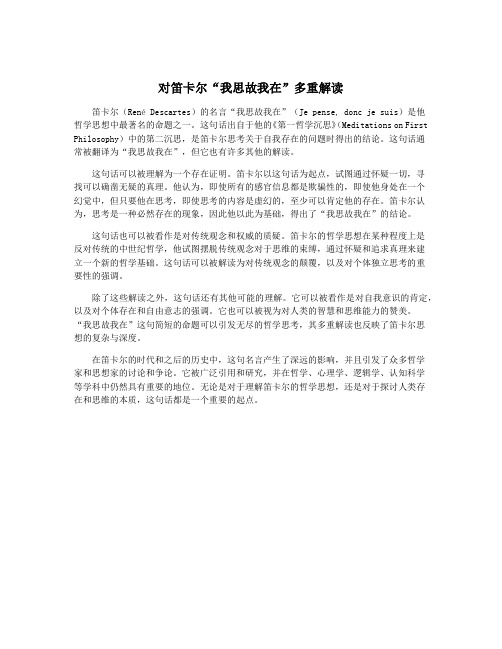
对笛卡尔“我思故我在”多重解读笛卡尔(René Descartes)的名言“我思故我在”(Je pense, donc je suis)是他哲学思想中最著名的命题之一。
这句话出自于他的《第一哲学沉思》(Meditations on First Philosophy)中的第二沉思,是笛卡尔思考关于自我存在的问题时得出的结论。
这句话通常被翻译为“我思故我在”,但它也有许多其他的解读。
这句话可以被理解为一个存在证明。
笛卡尔以这句话为起点,试图通过怀疑一切,寻找可以确凿无疑的真理。
他认为,即使所有的感官信息都是欺骗性的,即使他身处在一个幻觉中,但只要他在思考,即使思考的内容是虚幻的,至少可以肯定他的存在。
笛卡尔认为,思考是一种必然存在的现象,因此他以此为基础,得出了“我思故我在”的结论。
这句话也可以被看作是对传统观念和权威的质疑。
笛卡尔的哲学思想在某种程度上是反对传统的中世纪哲学,他试图摆脱传统观念对于思维的束缚,通过怀疑和追求真理来建立一个新的哲学基础。
这句话可以被解读为对传统观念的颠覆,以及对个体独立思考的重要性的强调。
除了这些解读之外,这句话还有其他可能的理解。
它可以被看作是对自我意识的肯定,以及对个体存在和自由意志的强调。
它也可以被视为对人类的智慧和思维能力的赞美。
“我思故我在”这句简短的命题可以引发无尽的哲学思考,其多重解读也反映了笛卡尔思想的复杂与深度。
在笛卡尔的时代和之后的历史中,这句名言产生了深远的影响,并且引发了众多哲学家和思想家的讨论和争论。
它被广泛引用和研究,并在哲学、心理学、逻辑学、认知科学等学科中仍然具有重要的地位。
无论是对于理解笛卡尔的哲学思想,还是对于探讨人类存在和思维的本质,这句话都是一个重要的起点。
第一哲学沉思集读后感

在《第一哲学沉思集》中,笛卡尔主要通过六个部分的沉思与论证表达了他对于上帝和人的灵魂这两个问题的看法并提出了第一哲学的概念,以下是精心整理的的相关资料,希望对你有帮助!篇一在《第一哲学沉思集》中,笛卡尔主要通过六个部分的沉思与论证表达了他对于上帝和人的灵魂这两个问题的看法并提出了第一哲学的概念,我重点读了前三个沉思。
笛卡尔的第一个沉思叫做“论可以引起怀疑的事物”。
首先他感觉过去一直有着的诸多见解都很可疑,感觉被蒙蔽。
所以为了寻求真理,笛卡尔决定抛弃所有旧有见解,重新开始;按逻辑分析,只要先从旧有见解所根据的原则下手就可以了,对于这些原则,一旦感觉它们欺骗过自己,就决不完全信任;于是笛卡尔发现人生好像是在梦中一样,因为没有任何明显的标记可以告诉自己这不是在做梦;既然连自己所见的身体或者环境都可能是假象的话,由于无中生有是不合逻辑的,那么至少还应该存在一些更一般、更简单的东西是真实的,正是由于这些东西的掺杂才构成了思维中的一切形象;于是笛卡尔怀疑是否有一个无所不能的上帝给予了自己这一切可见可感的事物或者说观念,但是他又因为上帝是全能的绝对善良的故而不可能允许自己所创造的东西犯错而拒绝了这一可能性;因此,笛卡尔做出了第一个结论:“凡是我早先信以为真的见解,没有一个是我现在不能怀疑的,这决不是由于考虑不周或轻率的缘故,而是由于强有力的、经过深思熟虑的理由。
”换句话说,笛卡尔认为普遍怀疑是必要的,一切皆可疑。
为了保持这一状态,笛卡尔时刻牢记这些推论,并提出“即便认识不了什么真理,但至少有能力不去下判断”的陈述。
笛卡尔的第二个沉思叫做“论人的精神的本性以及精神比物体更容易认识”,就是从这个沉思,后人提炼出了“我思故我在”的经典名言。
尽管那些对笛卡尔不甚了解的人会直接因此而把他打入主观唯心主义的牢笼中,我还是想说出自己的想法。
承接第一部分的内容,笛卡尔认为一切皆可疑,他很客观地提出这样一个观点:虽然暂时感觉这世上没有可靠的事物,但如果一旦找到了什么可靠的确定无疑的事情就能够打破之前的不可知论僵局。
论笛卡尔的“我思故我在”

论笛卡尔的“我思故我在”
笛卡尔的名言“我思故我在”是他在《第一哲学沉思》中提出的,它是对人类理性存在的一种确证。
这句话表达了人的思维能力与存在之间的密切关系,也就是说,只有当人在思考时才能证明自己的存在。
在笛卡尔的哲学思想中,他试图通过怀疑一切的方法找到一种不容置疑的真理。
他将注意力集中在自己的思维活动上,试图找到一个无法被怀疑的起点。
通过怀疑一切,他最终发现只有思考的存在是不可怀疑的。
笛卡尔认为,人的存在是通过思维来证明的。
无论怀疑者怀疑任何事物,他总会有一个疑问:“我在怀疑的是怀疑者存在吗?”无论怀疑者怎样怀疑,这个疑问都是不容置疑的,因为怀疑者在思考怀疑的时候,就证明了自己的存在。
通过思考,人们能够认识世界,也能够认识自己。
只有思考者存在,才能有思考的对象。
思考是人类特有的能力,它是人与其他动物的一个重要区别。
正因为人类有思维的能力,才能够意识到自己的存在,才能够真正体验到生命的意义。
“我思故我在”表达了笛卡尔对人类理性存在的一种肯定和自信。
通过思考,人们能够建立起自我与世界的联系,能够使自己的存在得到确认。
只有当我们思考时,我们才能意识到自己的存在,才能真正体验到生命的价值和意义。
我们也要意识到,“我思故我在”并不是笛卡尔哲学中的全部。
笛卡尔还提出了许多其他的观点,如神的存在、分离心灵与物质等。
这些观点都是为了探求真理、追求认识而提出的。
笛卡尔的哲学思想是一个复杂而庞大的体系,需要我们在学习和研究中加以深入理解。
对笛卡尔“我思故我在”多重解读

对笛卡尔“我思故我在”多重解读全文共四篇示例,供读者参考第一篇示例:笛卡尔的名言:“我思故我在”(Je pense donc je suis)是其《第一哲学沉思》(Meditationes de Prima Philosophia)中的一句重要论断。
这句话是笛卡尔对他的怀疑论方法的一个结论,它代表着笛卡尔对自己存在的最基本的证据。
这句话在现代哲学中却引起了许多不同的解读和讨论。
我们需要了解这句话的基本含义。
笛卡尔在《第一哲学沉思》中提出了怀疑论的方法,他认为要想找到真理就必须先怀疑一切。
在经过了一系列的怀疑之后,笛卡尔最终发现了一个不容怀疑的存在,即自己的思维。
他意识到,即使一切都可能是虚假的,但思考的这个过程却无法被否认。
他得出了结论:“我思故我在”,表明思考是不可怀疑的,而自己的存在也因此得到了证实。
这句话的确立却并不意味着人类对自身的真实性和存在问题得到了解决。
相反,它引发了更多的哲学思考和讨论。
在后来的哲学家中,对这句话的解读出现了多种不同的观点。
一种解读认为,这句话强调了思考作为存在的根本特征。
人类通过思考来认识世界,思考使得人类成为了一种特殊的存在形式。
这句话并不只是在论证自己的存在,更是在强调了人类作为思考者的特殊性。
另一种解读则认为,这句话是笛卡尔对传统的存在证明的一种颠覆。
传统的存在证明依赖于外部的证据或者理性的推演,而笛卡尔则通过思考来找到了自己的存在。
这种思考方式颠覆了传统的存在证明,提出了一种全新的认识论和存在论。
还有一种解读认为,这句话强调了自我意识的重要性。
只有通过思考,人们才能意识到自己的存在。
在这种解读下,这句话成为了人类对自身的一种探索和发现。
除了以上几种解读外,还有许多其他的观点。
无论是哪种解读,都给我们带来了对自身存在和思考的深刻思考。
这句话所反映出的哲学问题,也成为了现代哲学讨论的一个重要议题。
这句话的讨论还引发了许多心理学、神经科学、文学等领域的研究。
许多学者试图通过不同的方法来解读这句话所蕴含的深层含义,以及它对不同领域的影响。
笛卡尔第一哲学沉思集解读
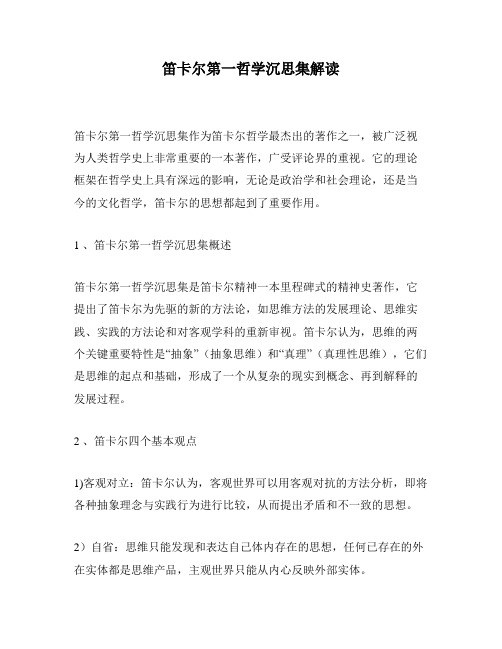
笛卡尔第一哲学沉思集解读
笛卡尔第一哲学沉思集作为笛卡尔哲学最杰出的著作之一,被广泛视为人类哲学史上非常重要的一本著作,广受评论界的重视。
它的理论框架在哲学史上具有深远的影响,无论是政治学和社会理论,还是当今的文化哲学,笛卡尔的思想都起到了重要作用。
1 、笛卡尔第一哲学沉思集概述
笛卡尔第一哲学沉思集是笛卡尔精神一本里程碑式的精神史著作,它提出了笛卡尔为先驱的新的方法论,如思维方法的发展理论、思维实践、实践的方法论和对客观学科的重新审视。
笛卡尔认为,思维的两个关键重要特性是“抽象”(抽象思维)和“真理”(真理性思维),它们是思维的起点和基础,形成了一个从复杂的现实到概念、再到解释的发展过程。
2 、笛卡尔四个基本观点
1)客观对立:笛卡尔认为,客观世界可以用客观对抗的方法分析,即将各种抽象理念与实践行为进行比较,从而提出矛盾和不一致的思想。
2)自省:思维只能发现和表达自己体内存在的思想,任何已存在的外在实体都是思维产品,主观世界只能从内心反映外部实体。
3)客观统一:笛卡尔建议客观对抗的方法论可以帮助我们理解主观事物的客观现实,进而认识到主客观的统一和协调关系。
4)物质观:笛卡尔强调“物质”的重要性,他认为,人们的行为必须受到客观的物质限制,思维才能在物质空间中发挥最有效的作用。
3 、重要影响
笛卡尔第一哲学沉思集给当今哲学界带来了深远的影响,开创了一种思维方法,以深入思考客观世界,为今后学者们提供指导和帮助。
例如,它可以帮助我们分析不同现象的深层含义,进而提出更有效的解决方案,可以为政治学和社会理论研究提供哲学指导,也为当今文化哲学的发展奠定基础,为新兴学科和新视角产生新鲜洞见,以拓展旧模式的束缚。
笛卡尔第一哲学沉思三大基础
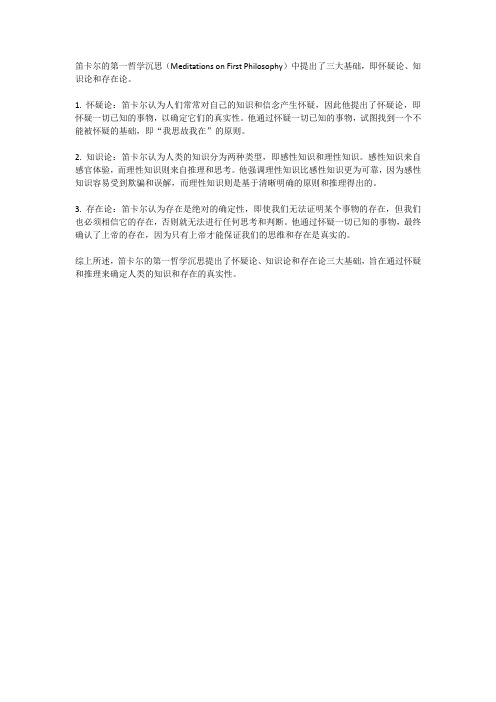
笛卡尔的第一哲学沉思(Meditations on First Philosophy)中提出了三大基础,即怀疑论、知识论和存在论。
1. 怀疑论:笛卡尔认为人们常常对自己的知识和信念产生怀疑,因此他提出了怀疑论,即怀疑一切已知的事物,以确定它们的真实性。
他通过怀疑一切已知的事物,试图找到一个不能被怀疑的基础,即“我思故我在”的原则。
2. 知识论:笛卡尔认为人类的知识分为两种类型,即感性知识和理性知识。
感性知识来自感官体验,而理性知识则来自推理和思考。
他强调理性知识比感性知识更为可靠,因为感性知识容易受到欺骗和误解,而理性知识则是基于清晰明确的原则和推理得出的。
3. 存在论:笛卡尔认为存在是绝对的确定性,即使我们无法证明某个事物的存在,但我们也必须相信它的存在,否则就无法进行任何思考和判断。
他通过怀疑一切已知的事物,最终确认了上帝的存在,因为只有上帝才能保证我们的思维和存在是真实的。
综上所述,笛卡尔的第一哲学沉思提出了怀疑论、知识论和存在论三大基础,旨在通过怀疑和推理来确定人类的知识和存在的真实性。
第一哲学沉思录

五分钟,让你轻松读懂笛卡尔的哲学名著《第一哲学沉思录》一假如我停止思维,也许很可能,我就同时停止了存在。
——笛卡尔,《第一哲学沉思录》你可曾想过,你是否拥有灵魂?你可曾想过,这世界是否有一个上帝?你又如何知道,眼下的生活不是一场梦境?笛卡尔在将近400年前写就的这本《第一哲学沉思录》,对上述几个问题进行了他的思考。
那他的答案是什么呢?你只需五分钟的时间,读完下面的内容,就能够获得答案。
笛卡尔决定,对自己所拥有的全部知识进行总的清算,区分哪些才是真理,哪里是谬误。
在第一个沉思里,笛卡尔对知识所依据的原则进行审视。
我们的许多知识,是由感官提供给我们的。
而感官并不值得信任,因为它经常欺骗我们。
最荒诞的是,我们甚至都不能清楚地分辨当下自己是清醒的还是睡梦中。
笛卡尔假想出一个充满狡诈和欺骗的恶魔,我们所看到的一切外界事物,都是他制造出来欺骗我们的假象。
如果世界真是这样,那我们如何才能认识世界的真相呢?世界上到底有没有可靠的东西呢?在第二个沉思里,笛卡尔尝试着去寻找这个问题的答案:在这个世界上是否有一件最确定无疑的事情。
笛卡尔希望将这个观点,当作一个支点。
就像阿基米德声称给他一个稳固的支点,他就可以用杠杆撬动地球,笛卡尔也希望将这个支点作为他整个真理知识体系的基石。
最后笛卡尔找到他要的这个点了吗?他认为他找到了,这个所有真理知识搭建的基石;这个世界上最确切无疑的事情;就是“我存在”。
根据第一个沉思,笛卡尔假定,我们拥有的对世界的所有认识都是值得怀疑的。
我们可能并没有身体,没有感官。
物体、形状、运动、空间,都可能并不存在,整个世界可能都是幻想,是一个充满狡诈和欺骗的恶魔制造出来欺骗我们的假象。
但即使这样,我们也能确定“有我,我存在”。
每当我在心里思考“我是否存在”时,就意味“我”必然存在。
因为只有“我存在”,才会有这样一个“我”,以供恶魔欺骗。
那这个存在的“我”,到底是什么东西呢?根据我们以往的感官经验,“我”以为自己是有躯体的。
笛卡尔思想总结

笛卡尔思想总结笛卡尔(RenéDescartes)是17世纪法国著名哲学家和数学家,他的思想对西方哲学和科学产生了深远影响。
笛卡尔的哲学思想被称为“笛卡尔思想”,强调了怀疑主义和理性主义的重要性。
在他的著作《第一哲学沉思》中,笛卡尔提出了如下论点:1. 怀疑一切笛卡尔认为,人类的知识常常受到错误和偏见的干扰。
为了确保获得真实和可靠的知识,他主张怀疑一切。
他提出了著名的“怀疑法则”,即只接受那些能够通过怀疑而无法被置疑的东西。
这种怀疑主义的态度使他开始重新审视自己所接受的一切信念和观点。
2. 怀疑对世界的存在笛卡尔提出了“我思故我在”的知识基础。
他认为,即使是最极端的怀疑也无法否认自己思考的事实。
通过这种方式,他探讨了他自己的存在,并质疑了对外部世界的信仰。
他将思想作为自己的存在的基础,认为自己的思维活动是不可置疑的。
这个观点成为笛卡尔思想的核心。
3. 分离思维和物质根据笛卡尔的观点,存在两种基本形式的事物:思维和物质。
思维是人类的由来,物质是外部世界的一部分。
他认为,思维和物质是完全不同的实体,而且相互独立。
这种分离思维和物质的观点迎合了他对怀疑主义的追求,因为他不再依赖于外部世界来证明自己的存在。
4. 理性主义笛卡尔强调人类的理性能力,认为只有通过理性的思维才能够获得真理。
他认为,只有通过清晰和明确的思考,人类才能够抵达正确的结论。
这种理性主义的立场对科学方法的发展有着深远的影响,追求真理的道路也因此变得更加重要。
5. 数学作为科学的基础笛卡尔主张数学是科学的基础,他认为数学是一种既清晰又明确的思维方式。
通过运用数学方法,人类能够发现自然界的规律,并推导出对于外部世界的认识。
这种强调数学的思维方式对于科学方法和科学研究产生了深远的影响。
总的来说,笛卡尔的思想强调怀疑主义、理性主义和数学的重要性。
他的哲学思想促进了对知识的重新审视,并对科学方法和科学研究产生了深远影响。
虽然他的某些观点在后来的哲学界遭到了质疑,但笛卡尔的思想仍然被认为是现代哲学和科学的重要里程碑。
哲学原理 笛卡尔
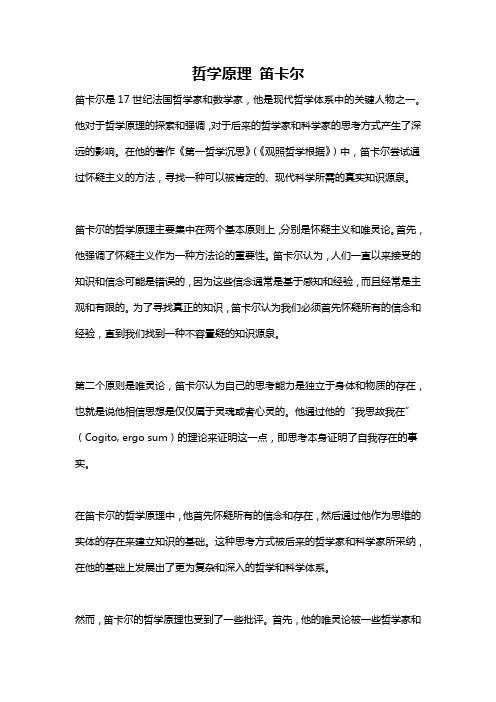
哲学原理笛卡尔笛卡尔是17世纪法国哲学家和数学家,他是现代哲学体系中的关键人物之一。
他对于哲学原理的探索和强调,对于后来的哲学家和科学家的思考方式产生了深远的影响。
在他的著作《第一哲学沉思》(《观照哲学根据》)中,笛卡尔尝试通过怀疑主义的方法,寻找一种可以被肯定的、现代科学所需的真实知识源泉。
笛卡尔的哲学原理主要集中在两个基本原则上,分别是怀疑主义和唯灵论。
首先,他强调了怀疑主义作为一种方法论的重要性。
笛卡尔认为,人们一直以来接受的知识和信念可能是错误的,因为这些信念通常是基于感知和经验,而且经常是主观和有限的。
为了寻找真正的知识,笛卡尔认为我们必须首先怀疑所有的信念和经验,直到我们找到一种不容置疑的知识源泉。
第二个原则是唯灵论,笛卡尔认为自己的思考能力是独立于身体和物质的存在,也就是说他相信思想是仅仅属于灵魂或者心灵的。
他通过他的“我思故我在”(Cogito, ergo sum)的理论来证明这一点,即思考本身证明了自我存在的事实。
在笛卡尔的哲学原理中,他首先怀疑所有的信念和存在,然后通过他作为思维的实体的存在来建立知识的基础。
这种思考方式被后来的哲学家和科学家所采纳,在他的基础上发展出了更为复杂和深入的哲学和科学体系。
然而,笛卡尔的哲学原理也受到了一些批评。
首先,他的唯灵论被一些哲学家和科学家视为过于理想主义和脱离实际。
一些人认为思想是与身体紧密联系的,而不仅仅是独立存在的。
另外,笛卡尔的怀疑主义也受到了一些批评。
一些人认为,对所有信念和经验的怀疑可能是不切实际和无意义的,因为我们不能完全否定我们的感知和经验。
此外,怀疑主义可能会导致无法建立任何形式的知识和理解。
总的来说,笛卡尔的哲学原理在17世纪对哲学和科学产生了重要影响,并且成为后来科学方法的基础之一。
然而,他的原则也有其局限性和争议性,需要结合其他的哲学和科学观点来进行更为全面的理解和应用。
- 1、下载文档前请自行甄别文档内容的完整性,平台不提供额外的编辑、内容补充、找答案等附加服务。
- 2、"仅部分预览"的文档,不可在线预览部分如存在完整性等问题,可反馈申请退款(可完整预览的文档不适用该条件!)。
- 3、如文档侵犯您的权益,请联系客服反馈,我们会尽快为您处理(人工客服工作时间:9:00-18:30)。
第一哲学沉思集---笛卡尔前言①关于上帝和人的灵魂这两个问题,我已经在《谈正确引导理性和在科学中探求真理的方法》②一书中谈过。
该书是于1637年用法文出版的。
在这两个问题上,那时我不过是顺便一谈,并无意深论,为的是看一看大家对这两个问题如何判断,我好从中摸索出一个方法来,以便我以后用这个方法谈论这两个问题。
我一向认为这两个问题非常重要,最好是多谈几次;而在解释这两个问题上,我采取的方式又很生僻,和人们通常用的方法大不相同,因此我认为在大家都能看得懂的法文书《谈方法》里把这两个问题提出来,不会有什么好处,我怕一般知识浅薄的人会以为我许可他们也来试探一下往这条路上走。
①法文第一版里没有《前言》,拉丁文版里和法文第二版里都有。
本文是根据1865年法文西门(Simon)版译的。
②简称《谈方法》。
在《谈方法》里,我曾请凡是在我的书里看出什么值得指责的地方的人,费心把这些地方告诉我;可是在我谈到的这两个问题上,除了提出来两点反驳以外,他们没有指出什么别的重要意见。
对于这两点反驳,我想在我比较确切地解释以前,先简短地在这里回答一下。
第一个反驳是:不能从人的精神对它本身进行反思时只看出它自己、看不出别的什么东西来这一事实就得出结论说,人的精神的本性或本质仅仅是思维;因为那样一来,“仅仅”这一词就把其他凡是有可能说得上也是属于灵魂的东西都排除掉了。
我对这个反驳的答辩是:我在那地方并不是有意按照事物的实在情况的次序(因为那时我还没有谈到事物的实在情况),而仅仅是按照我的思路的次序,把它们排除了。
我的意思是:我那时还不知道我是属于我的本质的,我只知道我是一个在思维的东西。
不过以后我将指出我是怎么从我不知道别的东西属于我的本质这件事引申出来事实上并没有别的东西是属于我的本质的。
第二个反驳是:从我心里有一个比我完满的东西的观念这件事不能得出结论说这个观念比我完满,更不能说这个观念所代表的东西存在。
我的答辩是:观念这个词在这里是有不同含义的。
它或者本身是我的理智的一种活动,在这个意义上,不能说观念比我完满;它或者可以客观地被当作这种活动所代表的东西,这个东西,虽然不能假定它存在于我的理智之外,可是由于它的本质的原故,它却可以比我完满。
在本书里我也将用更大的篇幅说明我怎么仅仅从我心里有比我完满的一个东西的观念这件事会引申出这个东西真实存在来。
除了这两个反驳以外,我还看到两个篇幅相当长的文章。
不过,这两篇文章与其说是攻击我所提出来的理由,还不如说是攻击我得出来的结论,因为这两篇文章所用的论据都是从无神论者们的共同论点那里搬过来的。
由于这一类论据不可能在以后能够正确理解我的理由的人们心中产生什么印象,同时也由于很多人的判断能力薄弱,不合道理,他们经常宁愿相信对事物先入为主的看法,尽管这种看法可能是错误的、违背理性的,而不愿相信相反的意见,尽管这种相反的意见很有说服力,并且真实可靠,而且以后是会为人们理解的,因此对这两篇文章我不愿意在这里进行答辩,我怕要去答辩,就不得不把这两篇文章的内容首先介绍一番。
现在,在充分理解了大家的意见之后,我再重新开始讨论关于上帝和人的灵魂问题,同时也给第一哲学打个基础。
不过,我既不想得到一般人的什么好评,也不希望很多人读我的书。
相反,除了愿意和我一起进行严肃认真的沉思并且能够脱离感官的干扰、完全从各种成见中摆脱出来的人(这样的人不多)以外,我绝不劝人读我的书。
至于毫不考虑我所讲的理由的次序和联系而断章取义、专门以吹毛求疵为乐的那些人(这样的人很多),他们读了我的书也不会得到什么便宜,尽管他们也许会找到机会对有些地方横加指责,然而他们挖空心思也做不出来什么紧急、值得答辩的反驳来。
我既不向别人许愿,说我能立即让他们满意,也不认为我有那么大本领足以预见到可能给每个人带来的困难,因而我将在《沉思集》里首先阐明我的想法,按照这种想法我是怎么相信我终于认识了真确、显明的真理,以便试试看是否用同样的理由我也能让别人相信这个真理,以后我再对那些博学多才的人给我做的反驳进行答辩。
我已经把我的《沉思集》给他们寄去了,让他们在该书付印之前审查一下。
他们已经做了那么多和各种各样的反驳,我敢说别的人很难再提出什么更重要、没有涉及到的反驳了。
因此我对想看《沉思集》的人做个请求,请他们费心在看过所有那些反驳和我对那些反驳所做的答辩之前,先不要下什么判断。
六个沉思的内容提要在第一个沉思里,我提出了只要我们在科学里除了直到现在已有的那些根据以外,还找不出别的根据,那么我们就有理由普遍怀疑一切,特别是物质性的东西。
尽管普遍怀疑的好处在开始时还不显著,不过,由于它可以让我们排除各种各样的成见,给我们准备好一条非常容易遵循的道路,让我们的精神逐渐习惯脱离感官,并且最后让我们对后来发现是真的东西决不可能再有什么怀疑,因此它的好处还是非常大的。
在第二个沉思里,精神用它本身的自由,对一切事物的存在只要有一点点怀疑,就假定它们都不存在,不过决不能认为它自己不存在。
这也是一个非常大的好处,特别是精神用这个办法很容易把属于它的东西,也就是说属于理智性的东西,和属于物体性的东西区分开来。
但是,有些人可能会等待我在这里拿出一些理由来证明灵魂的不灭,因此我认为现在应该告诉他们,对于凡是我没有非常准确论证过的东西都不准备写进这本书里去,那么我看我不得不遵循和几何学家所使用的同样次序:先提出求证的命题的全部根据,然后再下结论。
在认识灵魂不灭之前,要求的第一个和主要的东西是给灵魂做成一个清楚、明白的概念,这个概念要完全有别于对物体①所能有的一切概念:这在这里已经做到了。
除此以外,还要求知道我们所清楚、分明领会的一切东西,本来就是按照我们所领会的那样都是真实的。
这在第四个沉思以前还没有能够论证。
还有,什么叫物体性,还必须有一个清楚的概念,这个概念一部分见于第二个沉思里,一部分见于第五个和第六个沉思里。
最后,应该从这一切里得出一个结论:凡是清楚、分明地领会为不同实体性的东西,就象领会精神不同于物体那样,实际上都是分属于不同实体的,它们之间是实在有别的:这是在第六个沉思里做出来的结论。
在这个沉思里还证实了这一点:我们把一切物体都领会为是可分的,而精神或人的灵魂只能被领会为是不可分的,因为,事实上我们决不能领会半个灵魂,而我们却能够领会哪管是最小的物体中的半个物体,因此物体和精神在性质上不仅不同,甚至在某种情况下相反。
不过我没有必要在这本书里更进一步谈这个问题,一方面因为这已经足够相当清楚地说明,从肉体的腐烂得不出来灵魂的死亡,同样也足够给人们在死后有一个第二次生命的希望;同时也因为我们可以由之而推论出灵魂不灭的那些前提取决于整个物理学的解释。
这首先是为了知道:一般来说,一切实体,也就是说,要不是被上帝所创造就不能存在的一切东西,从它们的本性来说是不可毁灭的,并且要不是这同一的上帝②愿意撤回他平时的支持而把它们消灭掉的话,它们就永远不能停止存在。
其次是为了说明:在一般的意义下,物体是一种实体,因此它也是不死灭的;但是人的肉体就其有别于其他物体这一点来说,它不过是由一些肢体和其他类似的一些偶性组合成的;而人的灵魂就不是这样,它是一种单纯的实体,决不是由什么偶性组合起来的。
因为,即使它的一切偶性都改变了,例如它领会某些东西,它希求另外一些东西,它感觉一些东西,等等,不过它却永远是同一的灵魂③;而人的肉体,仅仅由于它的某些部分的形状改变,它就不再是同一的肉体了④。
由此可见人的肉体很容易死灭,但是精神或人的灵魂(我认为这二者是没有区别的),从它的本性来说是不灭的。
①法文corps这个词,按照汉语习惯可以分别作几种不同的译法:身体、肉体、物体、形体。
下同。
②这同一的上帝。
法文第二版是:上帝本身。
③法文第二版:但是灵魂却决不能变成别的东西。
④法文第二版:人的肉体就变成别的东西了。
在第三个沉思里,我觉得我已经把用来证明上帝存在的主要论据都相当详尽地解释了。
不过我没有想在这里在物体性的东西里边进行比较,来尽量地让读者的精神从感官摆脱出来,因而也许还剩有很多模糊不清的地方,这些模糊不清的地方,我希望在我对迄今给我提出来的反驳将做的答辩中完全得到澄清。
比如,在我们心里的一个至上完满的存在体的观念怎么会包含那么多的客观实在性,也就是说,从表象里分享了那么大程度的存在性和完满性,以致它必然应当来自一个至上完满的原因,这是相当难于理解的。
不过,在答辩里,我用了一个十分精巧的机器作为比较来阐明,这个机器的观念是存在于某一个工匠的心里。
这个观念在客观技巧上一定有一个原因,比如说,工匠的学识,或者这个概念是他从别人那里学来的,因此同样道理,在我们心里的上帝的观念也不可能没有它的原因,这个原因就是上帝自己。
在第四个沉思里证明了凡是被我们领会得非常清楚、非常分明的东西,都是真的;同时也解释了错误和虚假的理由①在于什么地方;这是必须知道的,一方面是为了证实以前的那些真理,一方面也是为了更好地理解以后的那些真理。
但是,需要指出的是:我在这个地方决不论述罪恶,也就是说在追求善与恶中所犯的错误,而仅仅论述在判断和分辨真与假时所产生的错误;我不打算在这里谈属于信仰的东西,或生活中的行为的东西,而只谈有关思辨的真理和只有借助于自然的光明②才能认识的真理。
①法文第二版:“错误和虚假的性质”。
②“自然的光明”指理性而言。
在第五个沉思里,除解释一般意义下的物体性以外,还用新的理由来论证了上帝的存在,在这些理由中虽然会遇到某些困难,但是这些困难我将在对给我提出的反驳所做的答辩里去解决。
还有,在那里也看到,几何学论证的正确性本身取决于对上帝的认识这一点怎么是真的。
最后,在第六个沉思里,我把理智活动和想像活动分别开来;我在那里描述了这种分别的标志。
在那里我指出人的灵魂实在有别于肉体,然而又和肉体紧密结合得就象一个东西似的。
由感官产生的一些错误以及避免错误的办法都在那里阐明了。
最后,我在那里指出了各种理由来说明物质的东西的存在,这并不是因为我断定这些理由对于它们所证明的东西是有好处的,例如有一个世界,人有肉体,以及诸如此类的事情,这些都是任何一个正常人从来没有怀疑过的;而是因为仔细观察起来,人们看出它们不如导致我们对上帝和我们的灵魂的认识的那些理由那样明显、有力,因而导致我们在精神上对上帝和我们的灵魂的认识的理由是最可靠、最明显的理由。
这就是我计划要在这六个沉思里证明的全部东西。
我在这里省略了其他很多问题,关于那些问题,我在这本书里也在适当的机会讲到了。
第一个沉思论可以引起怀疑的事物由于很久以来①我就感觉到我自从幼年时期起就把一大堆错误的见解当做真实的接受了过来,而从那时以后我根据一些非常靠不住的原则建立起来的东西都不能不是十分可疑、十分不可靠的,因此我认为②,如果我想要在科学上建立起某种坚定可靠、经久不变的东西的话,我就非在我有生之日认真地把我历来信以为真的一切见解统统清除出去,再从根本上重新开始不可。
